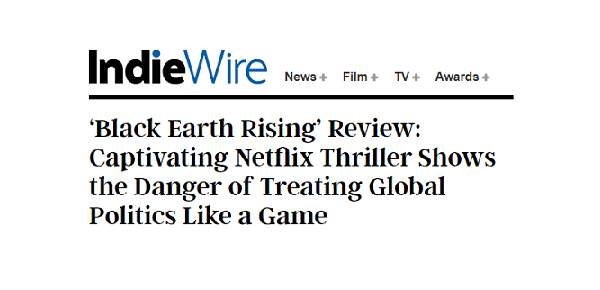Two eminently watchable TV series by Hugo Blick
Tuesday, January 29th, 2019[ by Charles Cameron — I suspect Mike Sellers & Ali Minai might find them of interest as subtle narrative avenues into complexity ]
.
I’ve been watching Black Earth Rising , British writer-director Hugo Blick‘s latest series, starring Michaela Coel:
As with his earlier series, The Honourable Woman featuring Maggie Gyllenhaal, I’m transfixed. Here is complexity delivered — in both cases, brilliantly — on TV:
Once Blick puts down his first card, as a viewer you think, “Oh, that’s good. That will be interesting.” Then he essentially flips the other 51 into the air and lets them fall all over the script. That’s the ambitious beauty of The Honorable Woman, which explodes across each episode with elaborate twists involving the Israelis, the Palestinians, the British and the Americans.
**
Sources:
Hollywood Reporter, The Complicated, Ambitious Brilliance of ‘The Honorable Woman’ Hollywood Reporter, ‘Black Earth Rising’: TV Review IndieWire, Netflix Thriller Shows the Danger of Treating Global Politics Like a Game
**
I have been discussing systems dynamics and complexity with my game designer friend Mike Sellers recently — see his brilliant book, Advanced Game Design: A Systems Approach — and complexity, glass bead games and AI with a new friend, Ali Minai — hear our podcast at BrownPundits. Let’s make it clear: I’m the student here.
In the course of our discussion, I’d written:
I think of novels and plays as offering approaches to an intuitive grasp of complex situations
and
I think polyphony and counterpoint are what we meet with in the social world, and indeed in our conflicted minds and hearts, and that Bach will prove to be the great master of our age, once we’ve matured enough to learn from him. But listening must come first, and that seems a skill that’s wildly at variance with our times..
Mike responded:
Novels and plays give us, I think, something of an implicit systemic view, in that we understand how a greater whole (a love story, a tragedy, etc.) emerges from the mutual interactions between actors. Same with counterpoint and polyphony — the notes mutually interact at the same time, and set up call-and-response interaction within our minds across time, to create a larger experienced whole from the entire musical piece.
I’m trying to make those relationships more explicit and more generalized, seeing the commonalities in books, music, biology, and games
so — for both Mike and Ali — I’d recommend these two Hugo Blick series as contemporary works of Shakespearean subtlety, to consider as avenues into coomplexity. And although I lack the linguistic skills to appreciate him I’m sure Ali would like to add the Urdu poet Ghalib to the list..
So that’s my interest.
Complexity, what is it? Which avenue takes us deepest into the heart of the matter?
**
Hugo Blick?
Hugo Blick, who likes to teach the ambiguities to which a probing sense of morality will necessarily find itself subject, might like to examine “Combat charities” in the West and their jihadi twin:
A NEW PHENOMENON OF THE 21ST CENTURY BATTLEFIELD
“Combat charities”—entities that seek to provide non-profit military and political assistance to weaker armed groups or minorities resisting the military onslaught of others (like ISIS)—are one mechanism for foreign anti-ISIS volunteers to join the fight. “Combat charities” are a new rising phenomenon of the 21st century battlefield and political dispensation. They can significantly affect both local orders and international politics. [ … ]
Thousands of Western foreign fighters have traveled to the Middle East in recent years to join the fighting that has engulfed the region. They have overwhelmingly participated on the side of jihadi organizations like the Islamic State (ISIS) or the Jabhat Fateh al-Sham (formerly the Nusra Front).
However, a smaller and often unnoticed segment of these volunteers has embedded with groups that resist the jihadis, such as Kurdish, Assyrian, and Yazidi militias. These fighters vary in their motivations for joining the fight: Some are driven by moral outrage and seek to prevent the atrocities minority groups have suffered at the hands of the jihadis, while others are motivated by co-religionist solidarity. Some seek a sense of adventure and the adrenaline highs of military tourism, while others wish to escape problems at home, finding in the fight a form of self-medicating for post-traumatic stress disorder and other problems. [ … ]
THE WESTERN PATHBREAKERS
SOLI is the oldest and most established combat charity in the world. Founded and led by American citizen Matthew VanDyke, it operates in Iraq, and is building abilities to operate in Syria and North Africa. Since its creation in 2014, SOLI has helped form, train, and to certain extent equip the two largest Assyrian militias in northern Iraq fighting against ISIS. [ … ]
…AND THEIR JIHADI TWIN
Founded in May 2016, Malhama Tactical is the first sunni jihadi private military company. As Rao Komar, Christian Borys, and Eric Woods reported in Foreign Policy magazine in February, during its short existence Malhama Tactical has provided training and battlefield consulting for Jabhat Fateh al-Sham (formerly known as the Nusra Front, affiliated with al-Qaida) and the Turkistan Islamic Party, an Uighur extremist group from China’s restive Xinjiang province.
Get that? Rival combat charities to throw a heavy dose of ambiguity into the already three-cornered Syrian situation..
IMO, these combat charities on both sides of an already fraught situation might make excellent fodder for Hugo Blick‘s subtle story-telling mind..
**
Viewing:
Netflix, Black Earth Rising Amazon, The Honorable Woman
Further reading — the full combat charities report:
Brookings, Combat charities or when humanitarians go to war:





 In fact, they offer a “
In fact, they offer a “

